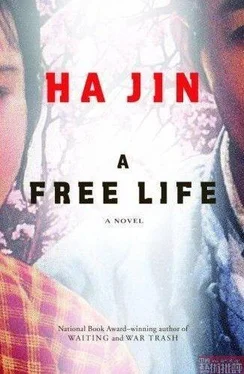A passionate exchange broke out between a Latino man and a myopic blonde over whether it was music or meaning that gave poetry the power to captivate the audience. The man, wearing a crew cut and an earring, emphasized that genuine poetry must sing, like the blues, and that meaning must come secondarily, whereas the woman argued that melodic sounds without meaning would be empty and valueless, so semantics ought to take priority in poetic composition. While she was speaking, she kept glancing at Nan over the top of her rimless glasses as if she expected him to disagree with her. Dick intervened and talked about "the auditory understanding," saying that sometimes even though we didn't get the meaning of a poem, we could still be moved just by listening to it, so there must be some inherent connection between the sound and the meaning. Ideally speaking, the sound should echo the sense, as Alexander Pope said three centuries ago. Despite the teacher's explication, the two students didn't seem reconciled, staring at each other from time to time. Nan wondered whether there had been some personal friction between them. Dick announced a ten-minute break, and Nan left without returning to the second half of the workshop.
Late in the afternoon, over a glass of Merlot, Dick asked Nan, "What do you think of my students?"
"Very impressive, especially zer nearsighted blonde."
"You mean Samantha, the tall one?"
"Yes. She's smart."
"Samantha knows more than the rest of the class. Actually, she's published a chapbook. Don't you want to come and join us here?"
"I cannot decide now. I have to be very careful about zis. You know I have a family and a business to take care of."
"As I told you before, you should try to become a professional poet eventually." Dick's voice then turned solemn. " 'The intellect of man is forced to choose / Perfection of the life, or of the work.' "
Nan knew he quoted some poet, but whom he couldn't say. He asked, "Why does it have to be one way or zee other? Why can't one have a middle way?"
"Like how?"
"Do you have to live a literary life to produce literary work?"
"Well, poetry has its own logic. If you want to be a poet, you may not have perfection of both the work and the life. It all depends on how much you're willing to sacrifice."
"Is zat why you don't have a family?"
"To some extent, yes."
"Zis is too much for me. Let me think about it, okay? I will let you know my decision soon, very soon."
"All right. Keep in mind that you have talent, but you need to give up a lot in order to develop your talent."
"I can see your lawgic, but I cannot rush to a decision."
"I understand. Some of our students had good jobs before they enrolled in our program. Remember the black guy with a mustache?"
"Yes. He's smart too."
"He used to be a physician in Milwaukee, with an M.D. from Duke. He came to the workshop because he wants to be the next Langston Hughes."
"Well, he would be better awff if he worked as a sailor or waiter."
Dick didn't seem to catch the irony. Yet at his own word "sailor" Nan 's lungs constricted. Before he met Pingping and after Beina had jilted him, he had dreamed of joining the merchant marine and sailing around the world, just as Langston Hughes had once worked on freighters. As a sailor he could have had a lot of time to read and write, which would have been a good way of becoming a writer. He sent query letters, together with his one-page vita, to several marine shipping companies, but none of them bothered to write back. People must have thought he was a freak, since they never expected applications for jobs, which were all assigned by the state regardless of personal preferences.
Dick offered to take Nan to a French place that evening, but Nan preferred not to dine out. He was tired of restaurant food and wanted to have something simple and wholesome. There was some long-grain rice in Dick's cupboard, so Nan boiled porridge and scrambled four eggs with diced tomatoes and panfried a pack of Polish sausages. Dick enjoyed Nan's cooking, which he said was the only thing he missed about Atlanta. They drank two bottles of wine between them and talked deep into the night.
DRIVING back by I-74, Nan got off at Red Cedars, Illinois, where Beina was living. On entering the town, he stopped at a food mart and bought a bag of beef jerky for Taotao. He asked a saleswoman for directions, and she said Huron Road was in the north, about half a mile away and close to a cemetery. Without further delay he drove into Red Cedars. It was almost midmorning, yet the town, more like a big village, seemed still asleep, white clapboard houses wet with rainwater and some partly obscured by gray bushes. After Nan passed a traffic light, a cafe appeared, but it looked empty inside despite four cars parked before the yellowish cottage. In some front yards of the homes along the streetside, apples and pears were strewn under trees, half eaten by birds and animals, and yellow jackets buzzed into or exited from the holes in the fruit the birds had made. With little difficulty Nan found Beina's place, a pinkish house with peeling paint and an overhanging second story. It sat on a slope at the end of the narrow street. His heart was thumping. Would she be in there? It was Thursday and she was probably out at work. He went up to the front door and rang the doorbell, but it was either broken or disconnected, no sound coming from inside. So he clanked the brass knocker shaped like a horseshoe, hoping her husband wouldn't be the one to come out.
An old Chinese woman in a powder blue housedress appeared, holding the door ajar. "Who are you looking for?" She sized Nan up, her eyes glassy and shrewd.
"Does Beina Su live here?" asked Nan.
"Yes. You are…?"
"I'm a former classmate of hers, back in China, I mean. Is she home?"
"No." Her face didn't change. "She's at her office, at Fifty-seven Chauncy Street, near McDonald's. Go down the road and take a left at the second light. That's Chauncy. You won't miss it." She pointed at a large orange sign in the south that claimed amazing bargains!
Nan was surprised that she treated him as if he lived nearby. He asked, "Aunt, are you her mother-in-law?"
"Yes. I'm taking care of their kids. My son is in-he's correcting his students' homework. Won't you come in and talk to him?"
" No, no need to trouble him. I have to go along without further delay."
He thanked her and drove away slowly, feeling lucky that he hadn't run into Beina's husband, that rabbit-faced man, who might have been able to guess who he was.
Having taken two turns and passed a few stores and a McDonald's with a fenced-in playground for children, Nan found 57 Chauncy Street, which was a two-story brick building housing several business offices. He regretted not having asked the old woman what kind of work Beina was doing, but looking through the directory in the vestibule, he saw "Oriental Healing Arts Studio" and "Yoga Workshop." He decided to go to room 206 first, where the studio was. As he climbed up the stairs, the wooden steps edged with cleated iron sheets, sharp creaks shot up from under his feet. He tried to walk lightly; still the noise wouldn't go away. He looked up and could tell that the building must once have been a factory, the ceiling at least fifteen feet high and massive wooden pillars visible in places.
For some reason his heart was calm, as if this were a regular visit to an insurance agent or a physician. Beside the frosted-glass door of room 206 stood a small artificial pear tree in blossom, planted in a plastic pot. Nan knocked on the door, but no one answered. He turned the handle and went in.
At the sound of the door chime, a woman cried from an inner room, "I'll be with you in a minute." Nan recognized Beina's voice, which sounded lively but a little forced, neutral in the tone adopted for business use. She then asked someone in a subdued tone, "How do you feel when I twist this needle?"
Читать дальше












